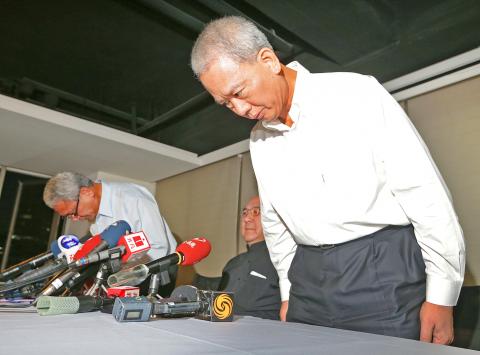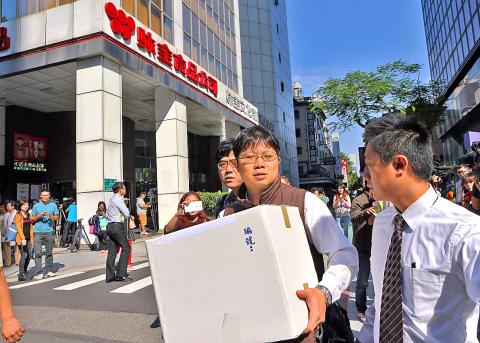Ting Hsin International Group (頂新國際集團) yesterday said it would withdraw from the oil-manufacturing market and donate NT$3 billion (US$98.65 million) to the government to atone for the food safety scandal.
The group made the announcement following days of turmoil caused by its subsidiary Cheng I Food Co Ltd (正義) after it added oils meant for animal feed to its cooking oil products.
“Under the current sentiment to boycott Ting Hsin, no matter what we do we understand it would not be enough to regain the trust of the public,” Wei Ying-chiao (魏應交) — chairman of Ting Hsin International Group — told a press conference in Taipei.

Photo: CNA
He said the group had decided to close its oil-manufacturing businesses in Taiwan and take full responsibility for the latest cooking oil scandal, pledging to fully refund and compensate consumers for any damage caused.
The Wei family has invited Taiwanese tycoon Samuel Yin (尹衍樑) to lead a new food safety committee set up by the group, hoping that Yin and other professionals can objectively evaluate the nation’s food safety loopholes as a way to revive public confidence in Ting Hsin, Wei Ying-chiao said.
“After the establishment of the committee, Ting Hsin will have more time to deal with its own management problems,” Yin told the press conference, without elaborating.

Photo: CNA
Yin is chairman of Ruentex Group (潤泰集團), the operator of RT-Mart (大潤發) hypermarkets in Taiwan and China. His business interests range from textiles, construction and retail sales to life insurance.
Wei Ying-chun (魏應充), former chairman of Cheng I, Ting Hsin Oil and Fat Industrial Co (頂新製油實業) and Wei Chuan Foods Corp (味全食品工業), was also present at the press conference, but he did not say a word.
After the press conference, Wei Ying-chun was taken to the Changhua District Prosecutors’ Office for questioning.
Prosecutors have listed Wei Ying-chun as a suspect in the scandal.
Wei Ying-chun arrived at the office in Changhua at about 8:40pm last night and was taken through a back door by officials.
Earlier yesterday, authorities conducted searches at Ting Hsin’s headquarters in Taipei 101, at the company’s product testing facilities and properties owned by the Wei family.
Coordinated by the Taiwan High Prosecutors’ Office, officials from local district prosecutors’ offices searched the offices of Wei Chuan Foods Corp (味全食品) in Taipei, the company’s food research center in Hsichih District (汐止), New Taipei City, the company’s food product analysis and testing center and Wei’s residence in the luxury condo complex The Palace (帝寶) in Taipei.
Prosecutors took away several cartons of evidence. Among the documents seized were the accounts of Wei Chuan Foods, along with sales orders and purchase receipts, officials said.
During the search at Wei Chuan Foods, Changhua prosecutors briefly questioned a number of high-level executives to clarify details related to the food scandal.

A magnitude 7.0 earthquake struck off Yilan at 11:05pm yesterday, the Central Weather Administration (CWA) said. The epicenter was located at sea, about 32.3km east of Yilan County Hall, at a depth of 72.8km, CWA data showed There were no immediate reports of damage. The intensity of the quake, which gauges the actual effect of a seismic event, measured 4 in Yilan County area on Taiwan’s seven-tier intensity scale, the data showed. It measured 4 in other parts of eastern, northern and central Taiwan as well as Tainan, and 3 in Kaohsiung and Pingtung County, and 2 in Lienchiang and Penghu counties and 1

FOREIGN INTERFERENCE: Beijing would likely intensify public opinion warfare in next year’s local elections to prevent Lai from getting re-elected, the ‘Yomiuri Shimbun’ said Internal documents from a Chinese artificial intelligence (AI) company indicated that China has been using the technology to intervene in foreign elections, including propaganda targeting Taiwan’s local elections next year and presidential elections in 2028, a Japanese newspaper reported yesterday. The Institute of National Security of Vanderbilt University obtained nearly 400 pages of documents from GoLaxy, a company with ties to the Chinese government, and found evidence that it had apparently deployed sophisticated, AI-driven propaganda campaigns in Hong Kong and Taiwan to shape public opinion, the Yomiuri Shimbun reported. GoLaxy provides insights, situation analysis and public opinion-shaping technology by conducting network surveillance

‘POLITICAL GAME’: DPP lawmakers said the motion would not meet the legislative threshold needed, and accused the KMT and the TPP of trivializing the Constitution The Legislative Yuan yesterday approved a motion to initiate impeachment proceedings against President William Lai (賴清德), saying he had undermined Taiwan’s constitutional order and democracy. The motion was approved 61-50 by lawmakers from the main opposition Chinese Nationalist Party (KMT) and the smaller Taiwan People’s Party (TPP), who together hold a legislative majority. Under the motion, a roll call vote for impeachment would be held on May 19 next year, after various hearings are held and Lai is given the chance to defend himself. The move came after Lai on Monday last week did not promulgate an amendment passed by the legislature that

AFTERMATH: The Taipei City Government said it received 39 minor incident reports including gas leaks, water leaks and outages, and a damaged traffic signal A magnitude 7.0 earthquake struck off Taiwan’s northeastern coast late on Saturday, producing only two major aftershocks as of yesterday noon, the Central Weather Administration (CWA) said. The limited aftershocks contrast with last year’s major earthquake in Hualien County, as Saturday’s earthquake occurred at a greater depth in a subduction zone. Saturday’s earthquake struck at 11:05pm, with its hypocenter about 32.3km east of Yilan County Hall, at a depth of 72.8km. Shaking was felt in 17 administrative regions north of Tainan and in eastern Taiwan, reaching intensity level 4 on Taiwan’s seven-tier seismic scale, the CWA said. In Hualien, the